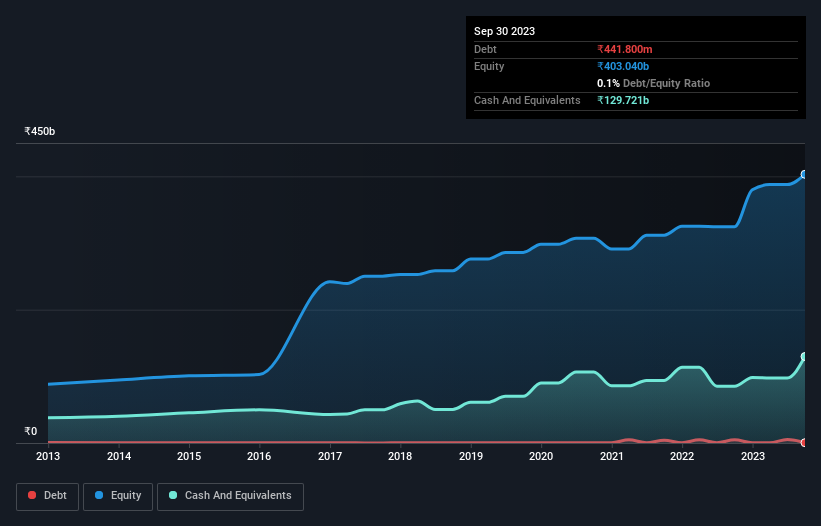
The external fund manager backed by Berkshire Hathaway's Charlie Munger, Li Lu, makes no bones about it when he says 'The biggest investment risk is not the volatility of prices, but whether you will suffer a permanent loss of capital.' So it might be obvious that you need to consider debt, when you think about how risky any given stock is, because too much debt can sink a company. As with many other companies Ambuja Cements Limited (NSE:AMBUJACEM) makes use of debt. But the real question is whether this debt is making the company risky.
What Risk Does Debt Bring?
Debt and other liabilities become risky for a business when it cannot easily fulfill those obligations, either with free cash flow or by raising capital at an attractive price. In the worst case scenario, a company can go bankrupt if it cannot pay its creditors. While that is not too common, we often do see indebted companies permanently diluting shareholders because lenders force them to raise capital at a distressed price. Having said that, the most common situation is where a company manages its debt reasonably well - and to its own advantage. The first step when considering a company's debt levels is to consider its cash and debt together.
View our latest analysis for Ambuja Cements
What Is Ambuja Cements's Debt?
The image below, which you can click on for greater detail, shows that Ambuja Cements had debt of ₹441.8m at the end of September 2023, a reduction from ₹4.75b over a year. But on the other hand it also has ₹129.7b in cash, leading to a ₹129.3b net cash position.

How Healthy Is Ambuja Cements' Balance Sheet?
The latest balance sheet data shows that Ambuja Cements had liabilities of ₹114.8b due within a year, and liabilities of ₹16.0b falling due after that. Offsetting these obligations, it had cash of ₹129.7b as well as receivables valued at ₹21.6b due within 12 months. So it actually has ₹20.6b more liquid assets than total liabilities.
This surplus suggests that Ambuja Cements has a conservative balance sheet, and could probably eliminate its debt without much difficulty. Simply put, the fact that Ambuja Cements has more cash than debt is arguably a good indication that it can manage its debt safely.
On top of that, Ambuja Cements grew its EBIT by 40% over the last twelve months, and that growth will make it easier to handle its debt. The balance sheet is clearly the area to focus on when you are analysing debt. But ultimately the future profitability of the business will decide if Ambuja Cements can strengthen its balance sheet over time. So if you want to see what the professionals think, you might find this free report on analyst profit forecasts to be interesting.
Finally, a business needs free cash flow to pay off debt; accounting profits just don't cut it. Ambuja Cements may have net cash on the balance sheet, but it is still interesting to look at how well the business converts its earnings before interest and tax (EBIT) to free cash flow, because that will influence both its need for, and its capacity to manage debt. Over the last three years, Ambuja Cements recorded negative free cash flow, in total. Debt is far more risky for companies with unreliable free cash flow, so shareholders should be hoping that the past expenditure will produce free cash flow in the future.
Summing Up
While we empathize with investors who find debt concerning, you should keep in mind that Ambuja Cements has net cash of ₹129.3b, as well as more liquid assets than liabilities. And we liked the look of last year's 40% year-on-year EBIT growth. So we don't have any problem with Ambuja Cements's use of debt. The balance sheet is clearly the area to focus on when you are analysing debt. However, not all investment risk resides within the balance sheet - far from it. Case in point: We've spotted 1 warning sign for Ambuja Cements you should be aware of.
Of course, if you're the type of investor who prefers buying stocks without the burden of debt, then don't hesitate to discover our exclusive list of net cash growth stocks, today.
New: Manage All Your Stock Portfolios in One Place
We've created the ultimate portfolio companion for stock investors, and it's free.
• Connect an unlimited number of Portfolios and see your total in one currency
• Be alerted to new Warning Signs or Risks via email or mobile
• Track the Fair Value of your stocks
Have feedback on this article? Concerned about the content? Get in touch with us directly. Alternatively, email editorial-team (at) simplywallst.com.
This article by Simply Wall St is general in nature. We provide commentary based on historical data and analyst forecasts only using an unbiased methodology and our articles are not intended to be financial advice. It does not constitute a recommendation to buy or sell any stock, and does not take account of your objectives, or your financial situation. We aim to bring you long-term focused analysis driven by fundamental data. Note that our analysis may not factor in the latest price-sensitive company announcements or qualitative material. Simply Wall St has no position in any stocks mentioned.
About NSEI:AMBUJACEM
Ambuja Cements
Manufactures and markets cement and cement related products to individual homebuilders, masons and contractors, and architects and engineers in India.
Flawless balance sheet with reasonable growth potential.


